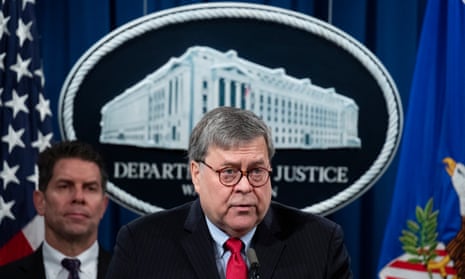William Barr, the US attorney general, has agreed to testify before a congressional committee over alleged political interference at the justice department, Democrats said, as they warned of “a crisis in the rule of law in America”.
Washington is reeling from aftershocks of the department’s unusual decision to overrule career prosecutors and seek a lighter prison sentence for the political operative Roger Stone, a longtime friend of the US president. The entire prosecution team resigned in protest.
On Wednesday, Democrats on the House judiciary committee wrote to Barr confirming that he had agreed to testify at a hearing on 31 March. Chairman Jerry Nadler wrote in the letter that the attorney general should expect to be asked about recent steps that “raise grave questions” over his leadership of the justice department.
These include, Nadler said, “the decision to overrule your career prosecutors and significantly reduce the recommended sentence for Roger Stone, who has been convicted for lying under oath, at the apparent request of the president – a decision that led to all four prosecutors handling the case to withdraw from the proceedings in protest”.
Stone, 67, a political operative and self-described dirty trickster, was convicted last November of lying to Congress, witness tampering and impeding the investigation into Russia’s interference in the 2016 election. On Monday, prosecutors requested that he serve seven to nine years behind bars. But Trump issued a late-night objection via Twitter, stating: “Cannot allow this miscarriage of justice!”
Hours later, a new memo from the justice department cut the proposed sentence, offering Stone’s “advanced age, health, personal circumstances and lack of criminal history” as mitigating circumstances. Media reports suggested Barr had personally intervened.
All four lawyers that prosecuted Stone abruptly quit the case, with one leaving the justice department altogether. On Wednesday, the White House insisted that Trump had not meddled, but on Twitter the president brazenly praised Barr for “taking charge of a case that was totally out of control and perhaps should not have even been brought”.
Later, speaking to reporters at the White House, Trump thanked justice department officials for trimming the sentencing recommendation. He declined to say whether he would pardon Stone. “They treated Roger Stone very badly,” he said.
But Chuck Schumer, the Democrat minority leader in the Senate, sounded the alarm about an unprecedented threat to the independence of the legal system.

“We are witnessing a crisis in the rule of law in America – unlike one we have ever seen before,” Schumer said in a speech on the Senate floor. “It is a crisis of President Trump’s making. But it was enabled and emboldened by every Senate Republican who was too afraid to stand up to him and say the simple word ‘no’, when the vast majority of them knew that that was the right thing to do.”
Trump was acquitted by the Republican majority in the Senate in his impeachment trial last week and immediately began a purge of officials who testified about his efforts to pressure Ukraine to investigate a political rival – fuelling Democrats’ fears that he would feel further emboldened, unleashed and able to act with impunity.
Two days after his acquittal, Schumer noted, Trump retaliated by firing members of his administration who testified in the impeachment inquiry, including Lt Col Alexander Vindman and Ambassador Gordon Sondland. He even dismissed Vindman’s brother. “How vindictive, how petty, how nasty,” Schumer said.
On Tuesday Trump withdrew the nomination of Jessie Liu, a former US attorney in Washington whose office prosecuted Stone, for a new post in the treasury department. But it was the Stone case that prompted Schumer to call for an emergency Senate judiciary committee hearing, where Barr would potentially be obliged to testify, and an investigation by the department’s inspector general, an external watchdog.
“The president is claiming that rigging the rules is perfectly legitimate – he claims an ‘absolute right’ to order the justice department to do anything he wants,” he said. “And the president has as his attorney general an enabler – and that’s a kind word – who actually supports this view.”
Schumer added: “We are seeing the behavior of a man who has contempt for the rule of law beginning to try out the new, unrestrained power conferred on him by 52 Republican senators … Left to his own devices, President Trump would turn America into a banana republic, where the dictator can do whatever he wants and the justice department is the president’s law firm, not a defender of the rule of law.”
The sentiments were echoed by Hillary Clinton, the former secretary of state who was defeated by Trump in the 2016 presidential election. She tweeted: “Trump is using the powers of the presidency like a tyrant – now, to reward accomplices and go after witnesses who dared to speak against him. This should concern and anger us all.”
Eric Holder, who served as Barack Obama’s attorney general, wrote on Twitter: “Do not underestimate the danger of this situation. This affects the rule of law and respect for it. Unprecedented.”
Yet most Senate Republicans, all but one of whom voted in Trump’s favour in the impeachment trial, again held the line. Senator Tim Scott of South Carolina told reporters: “I’m not disturbed about it at all. If you read the reports, this action began on Monday night before the president’s tweets, so I’ve got to take them at their word.”
However, Senator Susan Collins of Maine, who had claimed Trump would learn his “lesson” from impeachment, struck a note of dissent. “The president should not have gotten involved,” she told the Reuters news agency.
Stone is scheduled to be sentenced by the US district judge Amy Berman Jackson on 20 February. Jackson on Wednesday declined to grant Stone’s request for a new trial.
Barr last year cleared the president of obstruction of justice even when the special counsel Robert Mueller had pointedly declined to do so after the Russia investigation.
